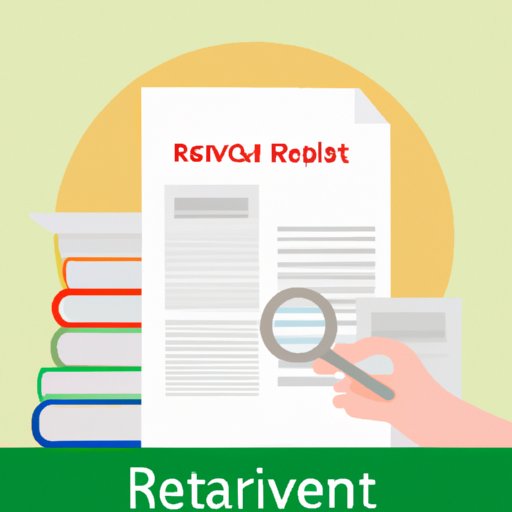Introduction
A literature review is an essential part of any research process. It involves searching, retrieving, evaluating and synthesizing relevant sources to create a comprehensive and current understanding of a specific topic. By conducting a literature review, researchers can gain a better understanding of their topic, identify gaps in the current research, and make connections with other studies.
Steps of a Literature Review
Conducting a successful literature review requires following a set of well-defined steps. The exact number of steps and their names may vary, but usually include the following:
Determine the Topic
The first step in any literature review is to determine the focus of the review. This includes selecting a topic, narrowing the scope, and developing a research question or thesis statement.
Identify Keywords
Once the topic has been determined, it is important to identify keywords and search terms related to the topic. This will help to find relevant resources when searching databases and other sources.
Search and Retrieve Relevant Sources
Using the identified keywords and search terms, researchers can begin searching for relevant sources. These can include databases, journals, books, websites, and other sources.
Evaluate Quality of Sources
Once the relevant sources have been located, it is important to evaluate the quality of the sources. This includes considering factors such as author qualifications, currency of information, and credibility of the source.
Synthesize Information
After the sources have been evaluated, it is time to synthesize the information. This can be done by summarizing, comparing and contrasting, or analyzing patterns in the sources.
Prepare Final Report
Finally, the results of the literature review must be presented in a final report. This should include an introduction, a discussion of the findings, and a conclusion.

Sources for a Literature Review
There are many different types of sources that can be used in a literature review. Some of the most common sources include:
Databases
Many universities and libraries provide access to online databases that can be used to search for relevant sources. Examples include PubMed, EBSCOhost, JSTOR, PsycINFO, and ProQuest.
Journals
Scholarly journals are another important source of information for a literature review. Journals often contain peer-reviewed articles written by experts in the field.
Books
Books can also be a valuable source of information for a literature review. These can include traditional print books, ebooks, and audiobooks.
Websites
In some cases, websites can be a useful source of information for a literature review. However, it is important to evaluate the credibility of the website before using it as a source.
Criteria for Selecting Sources
When selecting sources for a literature review, it is important to consider several criteria. These include:
Relevancy
First and foremost, sources must be relevant to the topic of the literature review. This means that the source should contain information that is directly related to the research question or thesis statement.
Timeliness
It is also important to consider the timeliness of the sources. Sources should be up-to-date, as older sources may no longer be relevant or accurate.
Scholarly/Academic Quality
Finally, it is important to consider the scholarly or academic quality of the sources. Sources should be written by qualified experts in the field and should be published in reputable journals or books.
Evaluating Quality of Sources
Once the sources have been selected, it is important to evaluate the quality of each source. This can include evaluating factors such as:
Author Qualifications
The author of a source should have qualifications in the subject matter. For example, a source about psychology should be written by someone with a degree in psychology.
Currency of Information
The information in a source should be up-to-date. Older sources may no longer be relevant or accurate.
Credibility of Source
Finally, it is important to consider the credibility of the source. This includes considering factors such as the reputation of the author and publication, whether the source has been peer-reviewed, and if the source has been cited in other works.

Strategies for Synthesizing the Literature
Once the sources have been evaluated, it is important to synthesize the information. This can be done using various strategies, such as:
Summarizing
One strategy for synthesizing the literature is to summarize the main points from each source. This can include noting key facts, ideas, and theories from each source.
Comparing and Contrasting
Another strategy is to compare and contrast the different sources. This can be done by looking for similarities and differences between the sources.
Analyzing Patterns
Finally, it is important to look for patterns in the literature. This can include identifying trends, themes, or commonalities between the sources.
Conclusion
A literature review is an important part of any research process. It involves searching, retrieving, evaluating, and synthesizing relevant sources to create a comprehensive and current understanding of a specific topic. By following a set of well-defined steps, researchers can conduct a successful literature review. This includes determining the topic, identifying keywords, searching and retrieving relevant sources, evaluating the quality of the sources, and synthesizing the information. Additionally, researchers should consider criteria such as relevancy, timeliness, and scholarly/academic quality when selecting sources. Finally, there are various strategies for synthesizing the literature, such as summarizing, comparing and contrasting, and analyzing patterns.
We hope this article has provided a comprehensive guide on how to do a literature review. With the right approach and determination, anyone can conduct a successful literature review. Good luck!
(Note: Is this article not meeting your expectations? Do you have knowledge or insights to share? Unlock new opportunities and expand your reach by joining our authors team. Click Registration to join us and share your expertise with our readers.)
